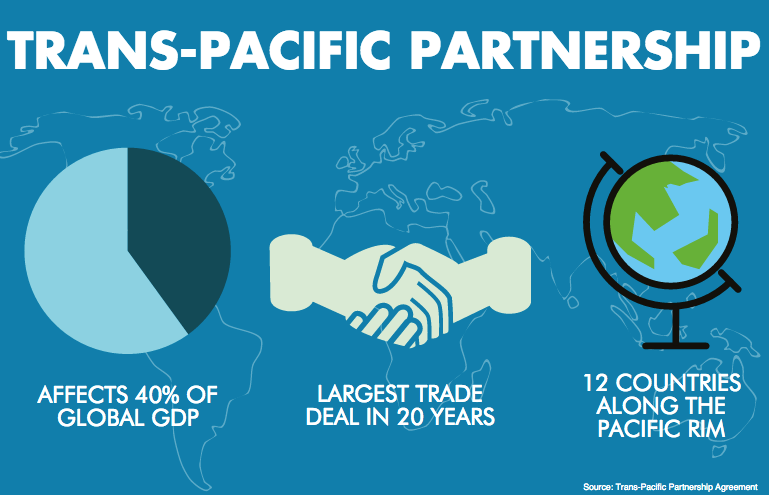
Trade ministers from a dozen Pacific nations at the Trans-Pacific Partnership meeting in Atlanta, Georgia (Courtesy: Reuters)
By Alex Martino and Katie Pedersen
Five days of closed negotiations in Atlanta culminated in a news conference this morning on the Trans-Pacific Partnership trade agreement.
The TPP was negotiated by 12 countries along the Pacific Rim and according to TPP officials, the results will affect 40% of the world economy, making it the largest trade agreement the region has seen since the North American Free Trade Agreement of 1994.
The announcement was scheduled for last night, but negotiations continued into the morning with agreements on dairy trade regulations not being met until 5 a.m.
Canadian farmers have spoken out against the TPP, most recently having brought tractors and cattle to Parliament Hill to protest. They argued that increased competition with the American market would put farmers out of jobs.
“We certainly don’t anticipate that there will be any job losses,” said Ed Fast, Canada’s Minister of International Trade and negotiator for the TPP agreement. “Obviously there will be some industries that will have to adapt.”
New Zealand Trade Minister Tim Groser said that TPP will allow for expansion of an almost non-existent international dairy trade sector.
“The extraordinary thing about dairy products which was one of the most sensitive issues we had to resolve here . . . is that New Zealand has only two and a half per cent of world dairy production and roughly, depending on how you measure it, one third of world trade,” said Groser.
Apart from agriculture and natural resources, digital services will also be affected by the TPP.
U.S. trade ambassador Mike Froman said that when business is conducted internationally over the internet, “they use telecommunication, software, electronic payment, and express delivery services. Those are all services covered by this trade agreement,” he said.
“To ensure that those services are kept open, that very much helps small- and medium-sized businesses that find the challenges of international trade to be significant,” he said.
The agreement also aims to regulate rules on patent and copyright law, environmental protection and labour standards.
Copyright regulations were not a major talking point at the news conference, however, Canadians have raised concerns about copyright provisions that conflict with current copyright laws.
The agreement must still pass through each of the 12 countries’ respective legislative bodies.
This may prove difficult for Canada, as the agreement comes weeks before the federal election, and has become an issue in the campaign.
“It would be the height of irresponsibility for a Canadian government to abandon a negotiation like this and not defend the interest of Canadians, which is why Canada stayed at the negotiation table and concluded negotiation,” said Fast.
Conservative leader Stephen Harper supports the TPP, while the NDP’s Tom Mulcair opposes it. Liberal leader Justin Trudeau has not taken a firm stance on the agreement.
The 30-chapter document will be released later this month, and will be debated and voted on in parliament after the election on October 19.

